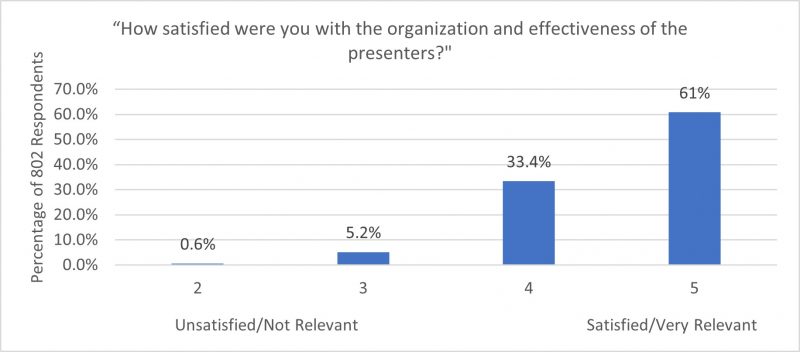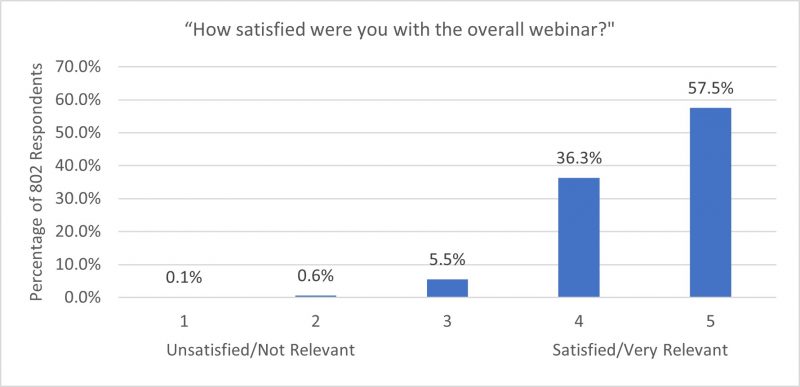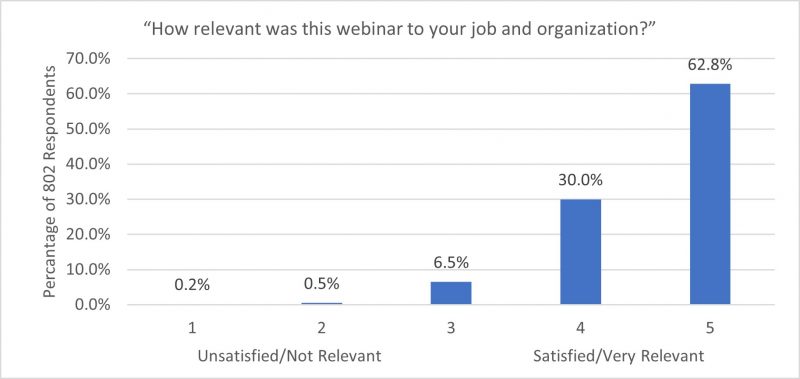Year In Review: Assessing USTTI’s Webinar Training
On March 11, 2020, the USTTI announced the postponement of our 5G and Emerging Technologies and Telehealth training sequences. Like the rest of the world, we were unaware of the challenges that lay ahead in 2020 and beyond. Fortunately, with the support and guidance of our USTTI Board Members and Program Sponsors, on June 4, 2020, the USTTI conducted our first webinar. In the 12 months that have followed, the USTTI has conducted over 50 webinars for well over 2500 individual participants maintaining our commitment to you, the women, and men of the developing world.
The USTTI delivered training programs taught by American Tower, Comcast, Ericsson, Facebook, the FCC, ICANN, Inmarsat, Intel, Microsoft, OneWeb, Qualcomm, TCI, Verizon, AFRINIC, Packet Clearing House, Andy Haire, Dale Hatfield and the University of Colorado at Boulder. . Through these programs the USTTI has continued to cover a vast variety of topics and areas of importance.
Since June 4, 2020, a sampling of the training programs we offered included:
- 5G Technical Overview
- Spectrum Allocation Considerations and Methodologies
- Creating an Enabling Environment for 5G
- DNS Security
- Effective Spectrum Management: Making Law & Technology Meet
- Emerging Technologies and Spectrum Planning
- Evolving Trends in Spectrum Management
- Funding Broadband Deployment using Auctions
- How to Establish a Resilient DNS Infrastructure
- Human Exposure to Radiofrequency (RF) Fields
- Internet Infrastructure Support in Times of Crisis
- Measuring Harmful Interference in a Rapidly Changing Spectrum Environment
- National Cybersecurity
- OpenRAN Training
- Public Safety Communications Policy
- Regulatory Approaches to Facilitate the Deployment of 5G
- Role of License-Exempt Spectrum in the 5G Era
- Spectrum Management and Monitoring
- Spectrum Sharing Overview
- The Impact of 5G on You, Your Country, and the World
- The Role of Satellite Communications in the 5G Ecosystem
- The Role of Satellites in Providing Next Generation Broadband Services
- USTTI ITU Pre-GSR Training Collaboration
- Wi-Fi and Unlicensed Technologies: An Update on Regulatory, Engineering, and Business
- Wireless Spectrum – Approaches to Licensing
In order to evaluate the effectiveness of these sessions, the USTTI issued questionnaires to officials that participated in our online training programs following each session. The results below show the overall strength of USTTI training and the effectiveness of our USTTI professors. Participants were surveyed on questions that included:
- How satisfied were you with the organization and effectiveness of the presenters?
- How satisfied were you with the overall webinar?
- How relevant was this webinar to your job and organization?
- Would you attend future USTTI online webinars?
- Would you recommend, to your organization and colleagues, participation in future USTTI Webinars?
A total of eight-hundred and two (802) responses were submitted.
The first three questions were done on a scale of 1 to 5, with 1 being unsatisfied/not relevant and 5 being very satisfied/very relevant.
For the question “How satisfied were you with the organization and effectiveness of the presenters,” 60.8% of respondents found the organization and effectiveness of the presenters to be very satisfactory (score of 5 out of 5). 33.4% of respondents gave the answer of 4 out of 5, 5.2% replied with an average rating (3 of 5) and lastly 0.6% (5 respondents) gave a score of 2 out of 5. Overall, 94.2% of the respondents gave a score of 4-5 on a satisfaction scale.

For the question “How satisfied were you with the overall webinar,” 57.5% of respondents found the overall webinar to be very satisfactory (score of 5 out of 5). 36.3% of respondents gave the answer of 4 out of 5, 5.5% replied with an average rating (3 of 5), 0.6% (5 respondents) gave a score of 2 out of 5 and lastly 0.1 (1 respondent) gave a score of 1 out of 5. Overall, 93.8% of the respondents gave a score of 4-5 on a satisfaction scale.

For the question “How relevant was this webinar to your job and organization,” 62.8% of respondents found the relevancy of the webinar to be very satisfactory (score of 5 out of 5). 30% of respondents gave the answer of 4 out of 5, 6.5% replied with an average rating (3 of 5), 0.5% (4 respondents) gave a score of 2 out of 5 and lastly 0.2% (2 respondents) gave a score of 1 out of 5. Overall, 92.8% of the respondents gave a score of 4-5 on a satisfaction scale.

The remaining two questions had three options for a response, yes, maybe and no. Those results are as follows:
For the question “Would you attend future USTTI online webinars,” 99.3% of respondents replied “Yes,” 0.6% (5 respondents) replied “Maybe,” and lastly 0.1% (1 respondent) replied “No.”
For the question “Would you recommend, to your organization and colleagues, participation in future USTTI Webinars,” 99.6% of respondents replied “Yes” and 0.4% (2 respondents) replied “No”
In addition, the questionnaire included the open-ended question “Can you provide specific examples of how you have applied the information shared in the webinar to your current work?” A sampling of those responses is below:
- With interference resolution, it has given me a better understanding of the different types of interference I might encounter on the field and how to best resolve them.
- Establishing CERT teams, Developing Data center Cybersecurity Policies procedures and guidelines
- I have been recently been nominated to be part of a National Radio Frequency Plan Working Group, the principles learned from the webinars will be applied fruitfully in this coming project.
- Understanding of current and future trends in allocations facilitates audits regarding efficiency and efficacy of relevant institutions and its responsibilities, improve backgrounds and knowledge for a more thorough evaluations.
- We have provided cloud services to our customers and there are many ways in which this knowledge is going to be applied in order to provide secured services to our clients.
- Kudos for pivoting to online. I was never able to travel in the past due to other commitments and so I never applied for the f2f courses. Online delivery has gone a far way towards helping me to get the kind of keen insights that are important to me, professionally as a member of my country’s Telecoms Reform Working Group
- In discussions with my supervisors on a possible review on policies on unlicensed frequencies with regards to primary and secondary usage in my country.
- We are developing a framework in Africa to open up the lower 6 GHz band for WiFi. The information that was shared was very helpful in understanding and enhancing our document on Wi-Fi and Unlicensed Technologies
- My work is related to the elaboration of standards for the certification of equipment in Argentina. Being aware of the evolution of WiFi technology is essential for the update of current regulations.
- I’m in charge of drafting new regulations on telecom sector for future, Spectrum allocation for 5G and wifi issues are very important to understand and to make the right regulations and it helps to prepare for WRC-23.
- To be applied in the future in spectrum planning and allocation of radio licenses.
- Drafting the Cyber Security Policy of the Ministry.
- I am currently working on a project that is expected to provide guidance for the industry. The session on regulatory principles gave me insight on aspects to focus on, in the project e.g how to ensure balance in regulation.
- The lessons learnt after attending the webinar on Human Exposure to Radiofrequency (RF) Fields helped me explain better to stakeholders that no negative health effects, such as cancer, is caused by exposure to frequencies emitted from cell towers.
- Nepal is now preparing a bid document for a launching satellite, where i can apply the information shared in webinar
- In my country, work is being done on assigning spectrum to new technologies. The work presented in the different webinars helped me a lot to collaborate in the different projects.
- This webinar benefited me with a deeper understanding of the ICANN ecosystem. Looking forward for more opportunities to learn and improve.
- The satellite basic web seminar provided me with the leverage to participate and offer valuable contributions to rural telephony project underway, Nigeria in which satellite is prime transmission of choice to deliver the project.
- The National Telecommunication Commission is currently in its deliberation of its ICT Modernization Program under the project called Upgrading of the Quality of Service System and Network Benchmarking Platform. I was able to gain insights/knowledge in all the webinars in particular in relation to our current projects in the Commission. During the deliberation of the said project, I was asked by my superior to give my views/comments, there I was able to give my opinion based on what I have learned and heard during the webinar also taking into consideration the best practice of other administrations. Likewise, I like most the topic on FCC Wireless Spectrum since it is very much relevant in the Commission as regulator. In one of our discussions with our Project Development Team, I have mentioned/shared what the FCC does in each approaches to licensing. Its licensing solutions were very much applicable and helpful. We can take from the licensing solutions they are applying, we can adapt it now specifically that the Commission is into in its plan of automation and reorganization in our spectrum management.
- We are working on agreement with neighboring countries, so the session that has been about cross border coordination help us a lot.
- During our management committee meetings of our office, I shared the information which I gained from the USTTI webinars which are very helpful in the discharge of the regulatory functions of our office. Also, I applied the information in the operations and decision makings in relation to our office mandate to have an effective and efficient delivery of services to the public.
- CRC is responsible for managing and planning, allocation of RF both Government and commercial use. USTTI training webinars were a very useful for CRC and to learning best practices in USA and future trends not only RF and it became general guides.
- We started to make strategy for future spectrum usage example 5G and future IMT
- I have applied knowledge acquired in developing our strategy and justification for license Renewal for my company
- Information I got from USTTI webinars helped me develop drafts of regulations in Somalia telecom sector, specifically the Licensing framework.
- In the development of a new work strategy for 2020-2023; based on the gathered information related to US experiences in modern spectrum management and 5G issues
